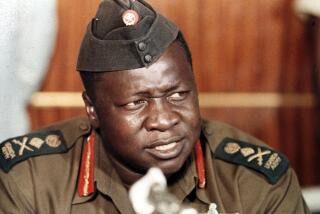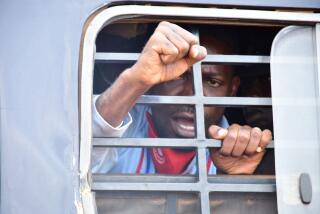Pop star plans to challenge Uganda’s long-ruling president in election

- Share via
Reporting from Kampala, Uganda — Since Bobi Wine was elected to the Ugandan Parliament in 2017, he has lost count of how many times he has been arrested.
“I’ve been tortured, I’ve been beaten. My house has been bombed,” he said in an interview on the veranda of his house down a dirt road in a leafy compound on the outskirts of the capital, Kampala. He wore the uniform of many politicians here: a dark tailored suit with a Ugandan flag pinned to one lapel.
Before Wine, whose real name is Robert Kyagulanyi Ssentamu, was a politician, he was one of the country’s best-known musicians, earning the moniker “Ghetto President” for singing about growing up in a slum and the many problems facing Uganda’s young population.
On Monday, he announced that he is running for president, launching a campaign to unseat one of the world’s longest-serving rulers, Yoweri Museveni.
“For a very long time, President Museveni has presented himself to the rest of the world as a diplomat … while he rules people at gunpoint,” said Wine, 37. “He’s always coming to you as a dictator in a suit, and unfortunately the Western world has always fallen for the suit. All we can do is expose him.”
Museveni, who is 74, came to power in 1986 after years of fighting the dictatorships of Idi Amin and Milton Obote, during which hundreds of thousands of Ugandans died. Museveni delivered desperately needed stability and economic growth, and he was a key member of the “new generation” of African leaders hailed by President Clinton for their friendliness toward foreign investment and rule of law.
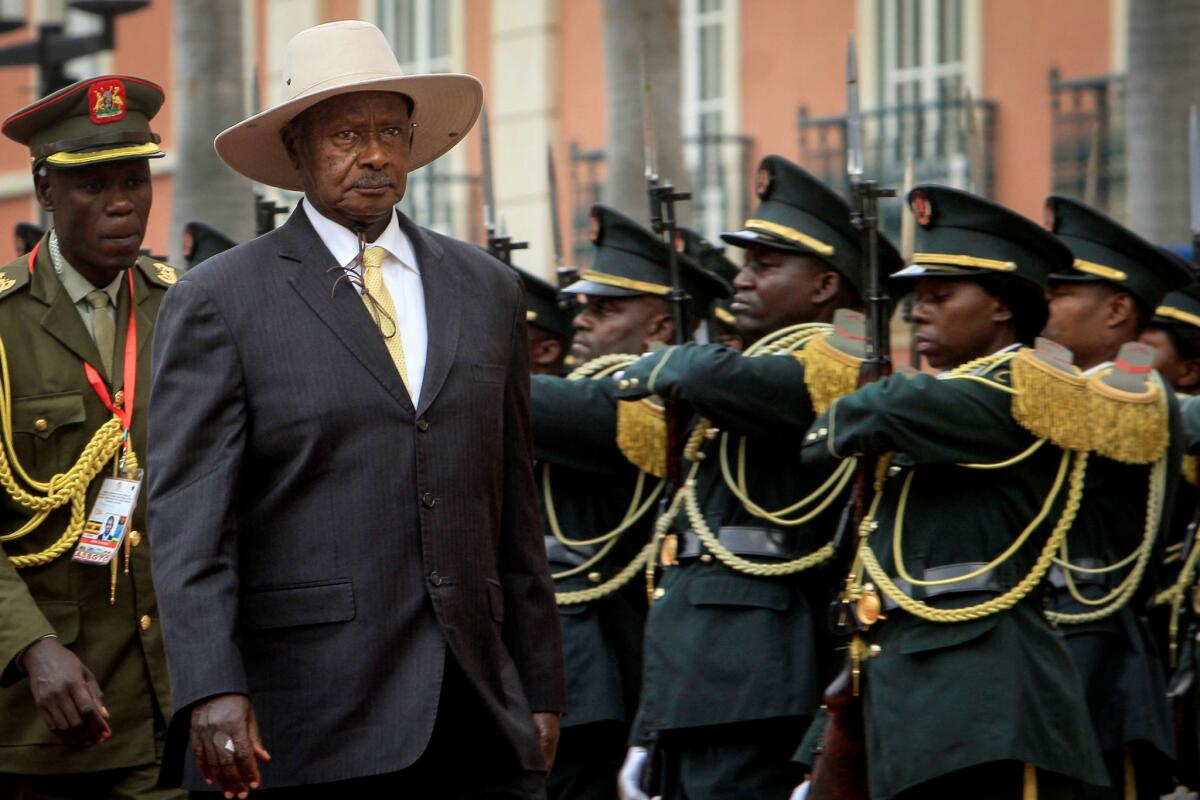
His support remains strong in rural areas, but polls suggest he might struggle to win an election today.
Critics — led by Wine — say his administration has become increasingly autocratic and out of touch as he finds new ways to cling to power.
Fourteen years ago, the Parliament, where Museveni’s ruling National Resistance Movement still has a comfortable majority, abolished the two-term limit for presidents, allowing him to keep running.
And in 2017, lawmakers passed a bill to remove the age limit of 75 for presidential candidates, paving the way for Museveni to run in upcoming 2021 elections — and potentially extend his time in office to 40 years and beyond.
Human rights and civil society groups accuse his government of harassing and even torturing opposition members and political activists, trying to silence the press, and blocking the right of citizens to peacefully assemble.
“The longer President Museveni stays in power, the more repressive he has become,” said Nicholas Opiyo, a prominent human rights lawyer in Kampala and part of Wine’s legal team. “The more lethal he has become in terms of how he deals with what he sees as opposition voices, the more ruthless he has become.”
Wine was able to parlay his fame as a musician into a formidable political movement called People Power.
It drew worldwide media attention in August 2018, after Wine and nearly three dozen others were accused of stoning the president’s convoy during a political rally in northern Uganda.
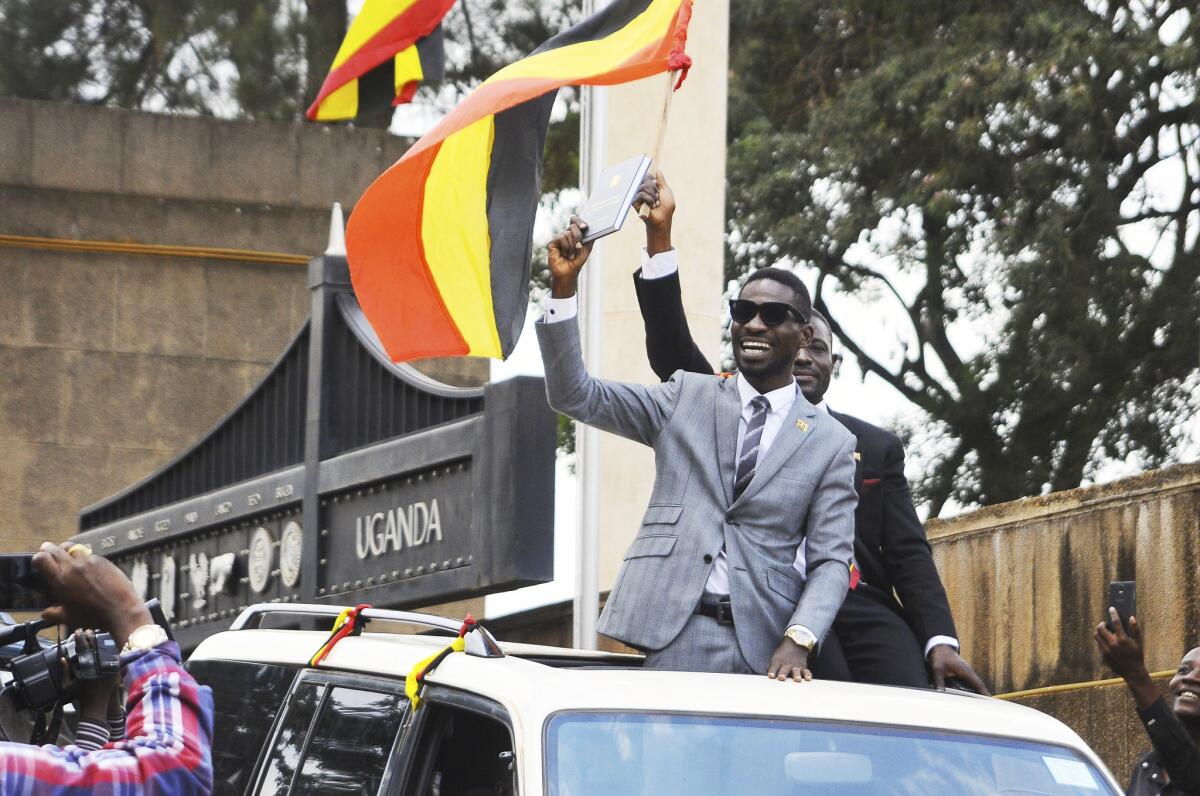
Wine’s driver was shot and killed in the violence that day, and Wine alleged he was detained and beaten by soldiers, who he said caused serious injury to his back, kidneys and testicles. Eventually he was charged with treason and released. The charge, which he has denied, has yet to be resolved.
The arrest sparked protests in Kampala, and a year later, walls across the capital are still marked with graffiti saying “Free Bobi Wine.”
As a lawmaker, Wine has continued to make music — a video for one song about his arrest got more than half a million hits on YouTube.
But he has been prevented from performing in Uganda. He said that the government has warned radio DJs against playing his music and that artists associated with his company, Firebase Entertainment, have had trouble getting jobs.
At the label’s headquarters in Kamwokya, where Wine grew up, a producer mixes a track on a laptop while a few other guys sit around in the small lobby, passing the time on their phones.
“It’s like we’re on holiday,” says King Lutz, a promoter who has worked with Wine for years. “Bobi’s the target.”
The standoff between Wine and the government has grown increasingly tense as unofficial campaigning for 2021 gets underway. In April, after Wine was arrested for allegedly holding an illegal rally last year, the government communications regulator issued an order to several news outlets to suspend more than three dozen journalists for their coverage of the arrest.
The Uganda Journalistn Assn. has taken the regulator to court and has managed to keep the journalists in their jobs at least until the case is heard in October.
Kiiza Eron, the lawyer representing the journalists, is also handling cases challenging recent government measures that he said are aimed at repressing freedom of expression and the press. Ugandans are now taxed 200 shillings — about 5 cents — a day to use social media platforms on their phones.
The government has denied that it is clamping down on free speech and says the social media tax was introduced to generate revenue.
Last year when Wine was arrested, Museveni called reports that he was seriously injured by security forces “fake news,” and accused the opposition politician and his supporters of intimidating ruling-party voters.
His administration dismisses that the notion that People Power’s influence is growing and says the movement is simply capitalizing on the fact that some Ugandans are naturally growing restless after three decades of the same president.
“Thirty-three years is long,” said government spokesman Ofwono Opondo P’Odel.
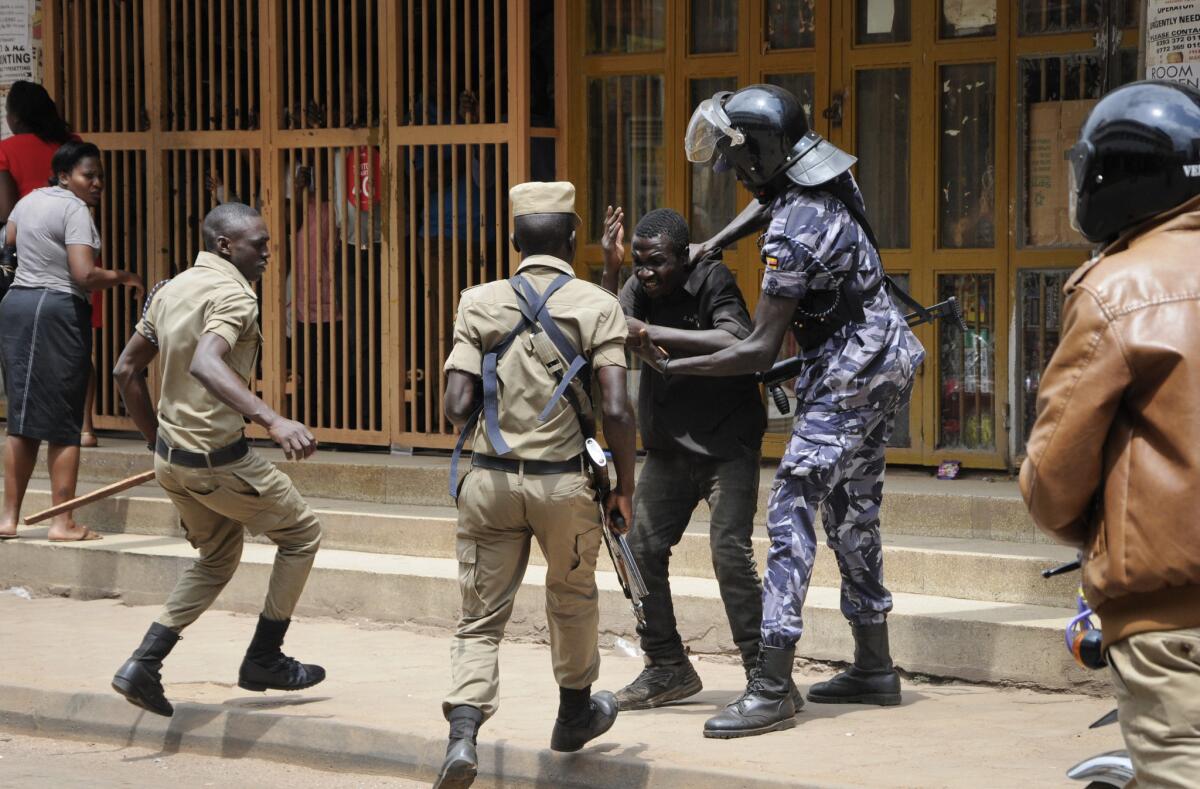
Opondo says that instead of using elections, opposition politicians are turning to “extra-constitutional” means and violence to try to force a change of government. He said the government has evidence that People Power supporters have been encouraged “to torch the country.”
Wine, who called Museveni a “frightened dictator,” said the movement is still gaining strength.
He recently formed an alliance with Kizza Besigye, a veteran opposition leader who has run against Museveni four times, reducing the chances that a split in the opposition will allow the president to win again.
With nearly 70% of Ugandans under age 25, Wine is depending in large part on voters such as the three young men hanging out in the metal workshop where they make ornate windows and doors, just off the main drag that runs through his legislative district, Kyadondo East.
They call themselves “ghetto youth,” and they say they’re into art, music, farming, welding and weed. These days, they say, they can’t pay their electricity bill, so they’re doing more hanging around than working.
Tony Lubimba, who is 27 and has a scar on the back of his head, where he says a cop hit him during a People Power demonstration, said he wasn’t sure what would happen if Wine won the election.
“I don’t think the president will allow it,” he said. “If Bobi wins, I think the army will come in very quickly.”
Mahr is a special correspondent.
More to Read
Sign up for Essential California
The most important California stories and recommendations in your inbox every morning.
You may occasionally receive promotional content from the Los Angeles Times.
